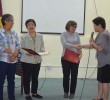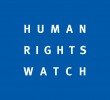NEWS RELEASE Ref: Mr. Shiegfred Roxas
18 April 2007 Tel. No.: 0922-7288044
PIMENTEL CITES NEED TO CORRECT FLAWS IN ABSENTEE VOTING LAW
Genuine Opposition senatorial candidate Aquilino Pimentel III today cited the need to correct legal flaws in the Overseas Absentee Voting Law that prevent or discourage overseas Filipinos from availing of the right to vote for national government officials of their homeland.
Unless these flaws are rectified, Pimentel said expatriate Filipinos, particularly those who have migrated to the United States, will remain indifferent to the exercise of their voting right.
The US is the adopted country of an estimated 3 million Filipinos � the largest group of Filipinos abroad.
Pimentel expressed disappointment over reports about the poor turnout of overseas Filipinos in polling centers being manned by Philippine diplomatic missions in various parts of the world since absentee voting started April 14.
Although there are about 6 million overseas Filipino workers (OFWs) in 114 countries, the Commission on Elections and Department of Foreign Affairs reported that only about 500,000 have registered for absentee voting.
Out of the estimated 3 million Filipinos in the United States, only about 140,000 have signed up as absentee voters.
Pimentel, a law practitioner who topped the 1990 bar examination, noted that around 70,000 OFWs are registered absentee voters in Hong Kong, representing one of the biggest groups of foreign-based Filipinos who have availed of this special voting right. Most of the Hong-Kong based OFWs are domestic helpers.
He observed that most expatriate Filipinos in the US have opted to forfeit their absentee voting right because they do not want to comply with the requirement under the law that they should execute an affidavit signifying their intention to reestablish their residence in the Philippines within three years from the time they register as absentee voters.
�Filipinos with immigrant status or applying as immigrant fear that their stay in the US may be jeopardized and their green cards may be cancelled if they sign the certification of their intention to return and live in the Philippines,� Pimentel said.
The senatorial contender from Mindanao pointed out that the Dual Citizenship Law of 2003 (Republic Act 9225) was meant among others, to restore the voting right of Filipinos who have acquired citizenship by virtue of this law.
Pimentel said the Supreme Court upheld the validity of the grant of voting right to dual citizens in a decision rendered on Aug. 4, 2006 in answer to a petition filed by Loida Nicolas-Lewis, a Filipino-American.
In upholding that the petitioner was entitled to vote in Philippine elections, the high tribunal held that �there is no provision in the dual citizenship law � RA 9225 � requiring dual citizens to actually establish residence and physically stay in the Philippines first before then exercise the right to vote.�
However, Pimentel said that contrary to expectations, the effectivity of the Dual Citizenship Law did not result in a significant increase in the number of registered absentee voters in the US.
Despite the favorable ruling of the Supreme Court, legal experts have continued to question the grant of the right to vote to dual citizens permanently residing in the US and other countries.
As pointed out by retired SC Justice Isagani Cruz, the 1973 Constitution, under section 1, Article V, provides:
�Suffrage may be exercised by all citizens of the Philippines not otherwise disqualified by law, who are at least eighteen years of age, and who shall have resided in the Philippines for at least one year and in the place where they propose to vote for at least six months immediately preceding the election.�
Moreover, RA 9225 provides under section 5 that �those intending to exercise the right of suffrage must meet the requirements under section 1, Article V of the Constitution, Republic Act No. 9189 known as the �Overseas Absentee Voting Act of 2003� and other existing laws.�
****** INBOX is an archive of press releases, statements, announcements, letters to the editors, and manifestos sent to Davao Today for publication. Please email your materials to davaotoday@gmail.com. Davao Today reserves the right to edit or refuse material for publication. *****
2007 Elections, Pinoy Life Abroad









